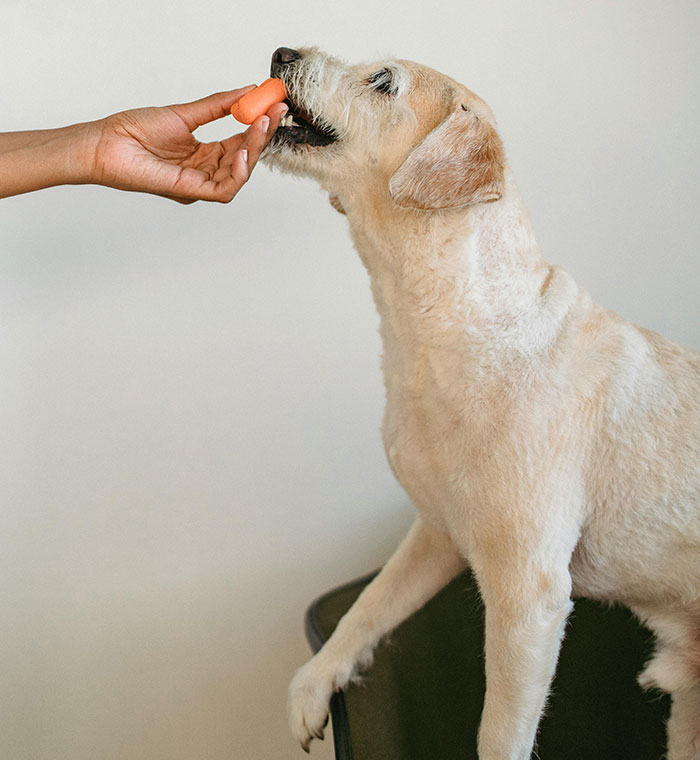Our dogs make lots of funny noises, from asking to be fed to when they’re chatting with their friends. However, sometimes dogs make noises that can worry us pet parents, especially when it comes from their stomachs.
In this article, we’ll examine why your dog’s stomach is making loud noises and what you can do about it.
Disclaimer: Please refer to the information in this article as a guide only. If you are worried about your pet’s health or behavior, it’s best to contact your veterinarian.
- Borborygmi is used to describe stomach/intestinal sounds in dogs.
- Gurgling can signal infectious diseases or foreign bodies.
- Sudden new food can cause a dog's stomach to gurgle.
- Gastric Dilatation and Volvulus in dogs is life-threatening.
- Vet visit needed if gurgling is with vomiting or lethargy.
This post may include affiliate links.
The information provided herein is for informational purposes only. Please refer to our disclaimer for more details..
Why is my dog’s stomach making noises?
Image credits: Pezibear.
A dog’s stomach, just like ours, can make sounds as the digestion process develops. The sounds can vary depending on what you feed your dog, and how long it has since they ate it. The sounds in the stomach can come from air being swallowed, gas diffusing from the bloodstream into your dog’s digestive system and gas being produced inside your dog’s digestive system (source).
Borborygmi is the word that veterinarians use to describe the sounds made by gas in the stomach or intestine. Gas in your dog’s gastrointestinal tract is pretty normal, to a certain extent, however, if it’s excessive you’ll want to get a veterinarian to check your pet in case there’s something wrong.
What are the causes of an upset stomach in dogs?
In this section, we’ll briefly explain some of the reasons why a dog might have an upset stomach.
Infectious Diseases
Diseases caused by bacteria, fungi, and viruses can affect your dog’s gastrointestinal system and could cause their stomach to gurgle. A dog can catch these infections when coming into contact with the poop of a sick dog.
Veterinarians recommend vaccinating your pet to help reduce the chances of them getting sick.
Foreign body ingestion
The term ‘foreign body’ refers to anything other than the intended food or drink that your pet ingests. From balls to toys and wrappers, dogs have been known to eat many interesting and sadly, problematic things.
Foreign body ingestion can seriously damage your dog’s stomach or intestinal tract and even be life-threatening. If you suspect that your dog ate something they shouldn’t, then you need to take them to your veterinarian as soon as possible.
New food
Image credits: Samson Katt.
When feeding anything to your dog for the first time, it’s best to introduce it slowly. If you suddenly give them something new, it’s likely to upset their stomach and could cause their stomach to gurgle.
Veterinarians recommend gradually mixing the new food into the old food in increasing increments before feeding them solely the new food.
Parasites
Parasites are a common cause of upset stomach in dogs and could cause their stomach to gurgle. It’s recommended to treat your pet for both ecto and endoparasites to help reduce the risk of their associated diseases.
Tumors
It’s pretty unlikely to directly cause gurgling, however, tumors can interfere with your dog’s digestion. This could lead to changes in the amount of gas inside their gastrointestinal tract and hence, more sound than usual being produced.
Eating something bad
Just like in us humans, if our dogs eat food that is spoilt, rotten, or contaminated, it can upset their stomach and cause it to gurgle.
If your dog tends to eat rubbish then it’s likely this could be a reason for them having an upset stomach. If the problem is particularly bad, you could try putting a muzzle on them during walks.
Gastric Dilatation and Volvulus
Gastric dilatation and volvulus is a very serious condition and can quickly become life-threatening. It is important to take your dog to a veterinarian straight away if you think they may have gastric dilatation and volvulus.
Gastric dilation refers to increased volume in the stomach. The increased volume means that the stomach can start to affect blood flow, breathing and can even burst open.
Additionally, if the stomach becomes large enough, it can change position and rotate, leading to further serious problems.
According to the American Kennel Club, signs of gastric dilatation and volvulus include (signs):
- Excess production of saliva.
- Large abdomen.
- Abnormal expression and interest in their abdomen.
- Dry heaving.
Eating too quickly
If your dog eats too quickly, they may swallow lots of air during mealtimes. This air usually exits your dog within a few hours but can cause stomach noises or gurgling until then.
If your dog eats too fast, you can try slowing them down using special food mats or bowls.
Is stomach gurgling a cause for concern and when does stomach noise mean a trip to the vet?
If your dog’s stomach is gurgling, then whether you should be concerned depends on the following factors:
- How long and with what intensity it’s gurgling.
- Whether it’s accompanied by any other symptoms.
- Whether your dog has had any problems with their stomach before.
- If you know that your dog has eaten something they shouldn’t or if they recently ate something new for the first time.
If the stomach gurgling is accompanied by any of the following symptoms, then it’s important to take your dog to a veterinarian as soon as possible:
- Vomiting.
- Diarrhea.
- Lethargy.
- Decreased appetite.
- Weight loss (if the condition is chronic).
- Increased saliva (drooling).
- Swollen or painful abdomen – in this case, your dog may have a ‘tucked up’, praying, or hunched posture.
Frequently asked questions
Let’s now take a look at the most common frequently asked questions regarding dog stomach noises.
Should I be worried if my dog’s stomach is gurgling?
As we mentioned earlier, a dig may have a gurgling stomach for a variety of reasons and whether you should be worried depends on the circumstances we discussed previously.
In general, if you are unsure about your pet’s behavior or health, then it’s best to take them to a veterinarian for a proper examination to check. Early diagnosis of problems often increases the chances of a thorough recovery.
If your dog’s stomach is gurgling in addition to the following symptoms, then it’s important to take them to a vet immediately:
- They are losing weight.
- They have diarrhea.
- They are vomiting.
- They have behavioral changes.
- They keep looking at their abdomen or seem to be in pain.
How long does it take for a dog’s tummy to settle?
The length of time it takes for a dog’s tummy to settle largely depends on the reason why it is upset in the first place.
For example, a dog who has an upset tummy due to eating something bad from your rubbish bin, or being transitioned onto a new type of food too fast, can take a few hours to a day for it to calm down.
Whereas, a dog who’s suffering from an infectious disease that affects their gastrointestinal tract, may need a little longer before they’re back to normal. In this case, it also depends on whether they are receiving medication or supportive care, which can greatly speed up the time it takes for their GI tract to get back to normal.
What can I give my dog for a gurgling stomach?
If your dog has a gurgling stomach then it’s best not to give them anything unless you’re following the advice of your veterinarian. It’s a good idea to contact your vet if you are concerned about your dog’s stomach noises. They will be able to advise you if the noises could mean something worrying.
If your vet recommends that your pet has a veterinary examination, then they will start by asking you questions about your dog and their stomach sounds. After that, they may do the following:
- Examine your pet – don’t worry if you them examining your pet in full and not just your dog’s digestive system. This is an important part of the examination process.
- Take blood – they may look for abnormalities in your dog’s blood cell count or biochemistry.
- X-ray or ultrasound – to gain a picture of your dog’s entire gastrointestinal tract from their stomach to their bowel.
- Stool sample – to look for parasites and their eggs.
Following their examination, your vet will hopefully reach a diagnosis and will be able to advise you on the best way to help them.
If there is nothing medically wrong with your pet, then they may have gurgling noises from eating too quickly. If this is the case, then you can try special mats or bowls to help slow down your dog’s meal times. Another thing you can try is breaking your dog’s meals into smaller portions throughout the day.
Conclusion
We hope you’ve enjoyed finding out why a dog’s stomach might gurgle and when you should do something about it. Don’t forget, that if you’re ever worried about your pet’s behavior, it’s best to contact your veterinarian.
1Kviews
Share on Facebook
 Dark Mode
Dark Mode 

 No fees, cancel anytime
No fees, cancel anytime 




















































12
0